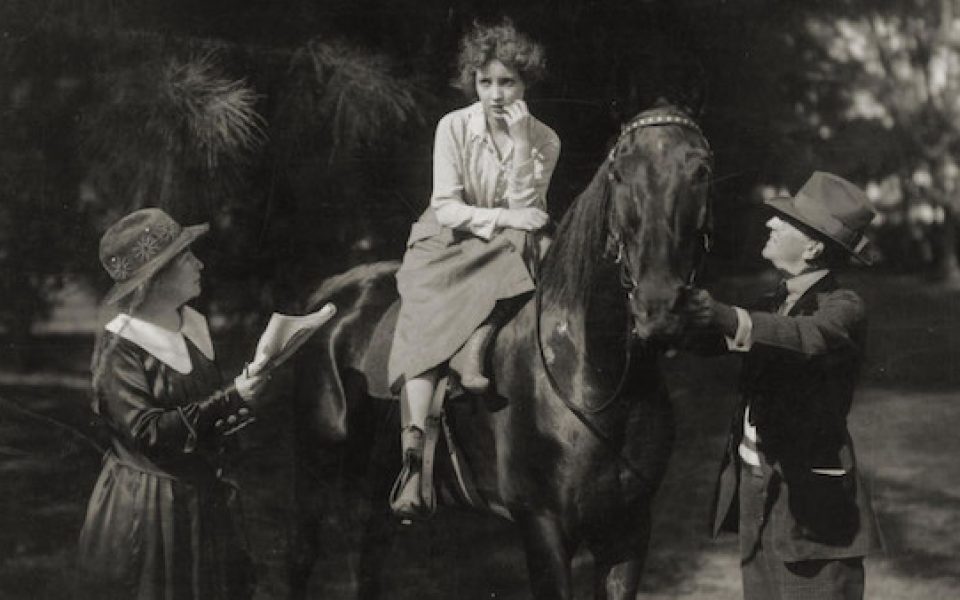Dir. Pamela B. Green, 2018, 103 min.
Considering the systematic discrimination against women directors and producers in the film industry (see review of This Changes Everything here), it might come as a surprise that women flourished at the medium’s inception in the late 19th Century and early 20th Century. Like their latter-day counterparts in computer coding, women played pioneering roles in the film industry precisely because it was uncharted territory and low-prestige work; only after the potential for massive profits was demonstrated did men move into leadership roles.
Alice Guy-Blaché started as a stenographer to Leon Gaumont, who began to market film camera and projector equipment in Paris in 1895. As this extraordinary documentary recounts, filmmaking developed almost as an afterthought to marketing the new equipment.
“So, I proposed to Monsieur Gaumont that I shoot some scenes,” recounts Guy-Blaché, who is known as the world first female director, in a 1957 interview. “He told me, ‘Well, it’s a young girl’s thing indeed. Well, you can try. But on one condition: Don’t let the mail suffer.’”
She makes the highly successful short feature “The Cabbage Fairy” in 1896, and almost singlehandedly establishes cinema as the modern preeminent storytelling medium. (Later, she also makes the first feature film with an all-black cast, by dint of the fact that white actors refused to appear in a production with her black lead.)
“Look at the films being made — a train coming into a station, waves breaking on a beach — who cares!” argues film historian Anthony Side. “They’re just boring subjects. Cinema could have died at that moment and nobody would have noticed. You really need people like Alice Guy to come in and show people there was more to cinema than just a stock shot.”
Not only was Guy-Blaché one of the most prolific directors of cinema’s first phase, Be Natural makes the case that her style influenced cinematic giants like Sergei Eisenstein and Alfred Hitchcock. Following her husband to the United States, she founds Solax studios, alongside Paramount, Universal and Fox in Fort Lee, NJ, described as “Hollywood 1.0,” turning out Westerns and films with strong female characters, along with movies that tackled “antisemitism, immigration and labor conflict” that received worldwide distribution.
A series of misfortunes, including her husband’s elopement with a mistress and a fire that destroys part of the studio in Fort Lee, ends Guy-Blaché’s remarkable career, but perhaps the coup de grâce is a structural change in film industry that took place in the 1920s.
“Wall Street money comes in the front door; women are forced out the back door,” explains Steve J. Ross, a history professor at the University of Southern California. “Alice would have no chance.”
The last 30 minutes of the film takes the form of a kind of crowd sourced detective story, featuring a battalion of film archivists, collectors, scholars and directors, to answer the question of why Guy-Blaché was practically written out of the history of the film industry. A major factor is the fact that no one bothered to preserve the prints of the first feature films. Other explanations include shoddy scholarship and most likely a heavy element of envy among male competitors.
The evangelical fervency of Guy-Blaché’s contemporary champions is likely to convert anyone who sees this documentary into a fan of the world’s first female director.
Be Natural: The Untold Story of Alice Guy-Blaché screens on April 8 at 8 p.m. and April 9 at 2 p.m. at Hanesbrands Theatre in Winston-Salem.
— JG
You may also enjoy these Riverrun 2019 reviews:
This Changes Everything: This star-studded documentary explores how film and television promote narratives that marginalize and render girls because women are denied the opportunity to tell stories as producers, directors and actors.
A Scientist’s Guide to Living and Dying: This drama, co-directed by and starring UNC School of the Arts alum Nitzan Mager, centers on a scientist named Amy, played by Mager, as she mourns the loss of her husband Chris while preparing to give birth to his child.
Find the full list of reviews here.
Join the First Amendment Society, a membership that goes directly to funding TCB‘s newsroom.
We believe that reporting can save the world.
The TCB First Amendment Society recognizes the vital role of a free, unfettered press with a bundling of local experiences designed to build community, and unique engagements with our newsroom that will help you understand, and shape, local journalism’s critical role in uplifting the people in our cities.
All revenue goes directly into the newsroom as reporters’ salaries and freelance commissions.


Leave a Reply